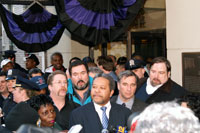Transit workers end strike
By
Milt Neidenberg
New York
Published Dec 22, 2005 11:15 PM
Dec. 22—The 34,000 members of
Transport Workers Union Local 100, led by President Roger Toussaint, decided to
suspend their powerful three-day strike today after the Metropolitan Transit
Authority agreed to drop its “final offer” and return to the
negotiating table to work out a new contract.
|
TWU Local 100 President Roger Toussaint
announces vote to end strike. He is
joined by (left to right) Local 100
Recording Secretary Darlyne Lawson,
ATU 1056 Pres. Ken Broderick,
ATU 726 Pres. Angelo Tanzi,
Local 100 Sec.-Treas. Ed Watt, and
ATU Intl. VP Larry Hanley.
|
One main sticking point had
been the union’s demand that the MTA take off the table its insistence
that all new employees pay a 6 percent pension contribution. Toussaint, at a
news conference today, spelled out the union’s position that the MTA had
forced it to strike by illegally insisting on pension changes.
According
to state mediators, who were brought in to resolve these thorny issues, the
final settlement would take a few days to work out. In the meantime, both the
union and management are forbidden from discussing the progress of the
negotiations.
Following Toussaint’s recommendation to suspend the
strike, the Local 100 Executive Board voted overwhelmingly to support their
union president and instructed their members to put down their picket signs and
return to work.
Threats to jail the union leader were then lifted, but not
the onerous fines on the union, starting at $1 million a day, imposed under the
state’s anti-labor Taylor Law.
New York Gov. George Pataki, a
millionaire, and Mayor Michael Bloomberg, a billionaire, had vowed that there
would be no negotiations unless the transit workers returned to work. However,
these servants of the ruling class toned down their ultimatums after the strike
demonstrated the unity of the workers and cost city businesses hundreds of
millions of dollars a day in lost sales.
The militancy of the transit
workers in walking out despite all the pressures on them won the respect of the
labor movement. Even a majority of the riding public polled by various media
blamed the strike on the intransigence of the MTA, which has a $1 billion
surplus but is trying to make new hires pay more for pensions and health care.
The workers also stress that they want respect and dignity. A vicious
attack on Local 100 leaders by Mayor Bloomberg, who publicly described them as
“thuggish,” backfired, leading to even greater public sympathy. As
one worker said to reporters, “We walked out strong, and we walk back
stronger.”
Articles copyright 1995-2012 Workers World.
Verbatim copying and distribution of this entire article is permitted in any medium without royalty provided this notice is preserved.
Workers World, 55 W. 17 St., NY, NY 10011
Email:
[email protected]
Subscribe
[email protected]
Support independent news
DONATE


